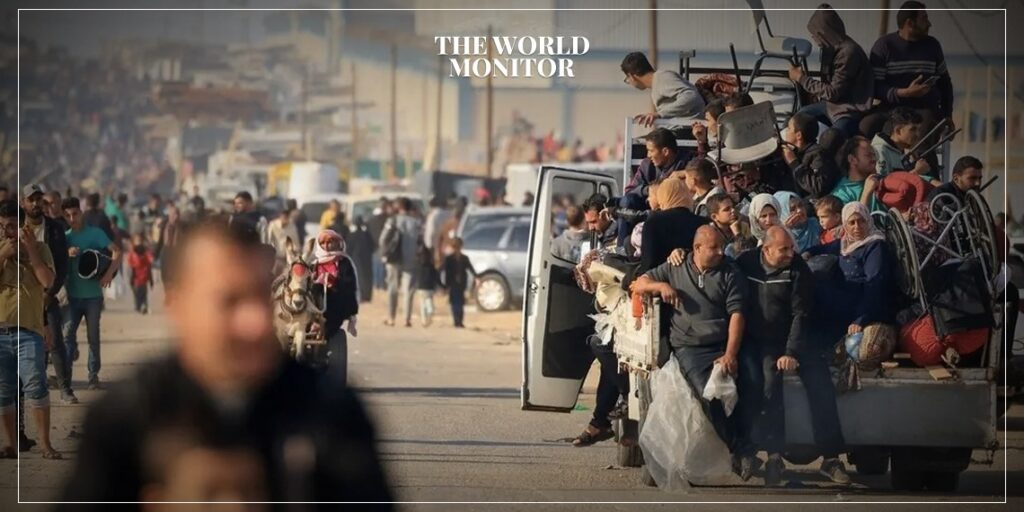
A Controversial Proposal: Trump’s Plan for Gaza and Its Implications
In recent times, we have seen the world of politics twist and turn in unexpected ways. One particularly surprising proposal has come from former President Donald Trump, who suggested that the United States should take control of the Gaza Strip and facilitate the relocation of its Palestinian population. This is a hefty topic that digs deep into the ongoing conflict in the Middle East, specifically the long-standing animosity between Israel and the Palestinian territories. In this article, we’ll explore what this proposal entails, the various reactions it has garnered, and the broader implications it has for both Israelis and Palestinians.
Understanding the Context: The Gaza Strip
Before diving into the proposal itself, it’s essential to understand what the Gaza Strip is and why it is a point of contention. The Gaza Strip is a small Palestinian territory bordered by Israel and Egypt. For many years, this area has been the epicenter of conflict between the Israeli government and Palestinian groups, particularly Hamas, which governs Gaza. Tensions have escalated over the years, leading to violence, military operations, and countless civilian casualties. Each party has its own beliefs and grievances, creating a complex and often tragic situation.
The recent Hamas attacks on Israel have reignited fears within Israeli society about security and the potential for further violence. These attacks are just one part of a much bigger picture that has led some to think outside the box for solutions—hence the proposal from Trump.
The Proposal: Transfer of Control
Trump’s suggestion that the U.S. should take control of Gaza and relocate its Palestinian population may sound extreme to many. But in the wake of recent violence, some Israeli politicians have begun to throw their support behind ideas that were previously considered too radical even for the most hardline factions in their government.
So, what exactly does this mean? Essentially, Trump is proposing that the United States step in and manage the Gaza Strip directly, with the added recommendation that Palestinians living there should be relocated. At first glance, this plan raises a lot of eyebrows—and for good reason. How can such a suggestion be considered a viable solution to the conflict?
Reactions: Mixed Responses from Israeli Politicians
When examining the reactions from Israeli politicians, it’s fascinating to see the range of opinions emerging. Some politicians view Trump’s proposal as a potential avenue for enhancing security—a way to put more distance between Israel and its perceived threats from Hamas. They argue that controlling Gaza may keep terrorist organizations at bay and stabilize a region that has been a hotbed of violence.
However, there are many who recoil at the very idea of the U.S. taking control of Gaza. Before this proposal, the notion of population transfer had generally been viewed as a fringe idea—associated more with dark chapters of 20th-century history than practical policy discussions. Yet Trump’s comments seem to have opened the floodgates for a line of thought that many thought had been permanently closed.
The Backlash: Human Rights Concerns
While some in Israel are debating the merits of Trump’s proposal, there has been an intense backlash from international leaders, human rights advocates, and Palestinians themselves. This backlash highlights the potential human rights violations that could arise from such a plan. Critics view any relocation of the Palestinian population as a violation of their basic rights—a notion that is echoed in numerous international laws which aim to protect populations from being forcibly moved or ethnically cleansed.
Imagine being told that you must leave your home, your community, your friends. This is the reality that many Palestinians fear if such proposals are taken seriously. Human rights advocates argue that instead of resolving conflicts, such measures could lead to increased instability, anger, and resentment among those displaced from their homes.
The Shift in Israeli Opinion
One particularly disturbing aspect of Trump’s proposal is the shift in Israeli opinion regarding once-fringed ideas about population transfer. Ideas that used to be considered extreme are now entering mainstream talks about security. They are becoming viable options for politicians who cling to the hope that reshaping the population can somehow ensure peace.
This shift is troubling because it suggests that as violence increases and fear ramps up, some people may be willing to sacrifice fundamental human rights for a false sense of security. This introduces the question: can true peace ever be achieved by displacing people and rewriting borders, or does it create more problems in the long run?
Looking at Alternatives: Hope for Resolution
While the situation appears daunting, it’s also crucial to consider other potential paths forward. Many experts believe that dialogue, diplomacy, and mutual understanding could be much more effective than any forced relocation or military solution. Initiatives that allow for collaboration between Israelis and Palestinians—such as economic partnerships, cultural exchanges, and community-building projects—can help to foster a sense of peace and cooperation.
Instead of uprooting entire populations, the focus should be on addressing the root causes of the conflict. By acknowledging each group’s grievances and working together to find acceptable solutions, there’s hope that a more sustainable and humane resolution can be reached.
Final Thoughts: What Happens Next?
As we digest this complex issue, one fundamental question arises: what does a peaceful solution look like in the eyes of the people affected? With multiple perspectives involved—each shaped by a particular history, culture, and set of experiences—it’s clear that any solution must be inclusive and respectful.
Considering the recent discussions around Trump’s controversial proposals, it’s essential for young people like you to ask these complex questions. What do you think the solution is? Do you believe that relocating a population is ever justified, even in the name of security? Or do you think that dialogue and understanding are the keys to peace?
Your thoughts and opinions matter. Share your views in the comments below!





